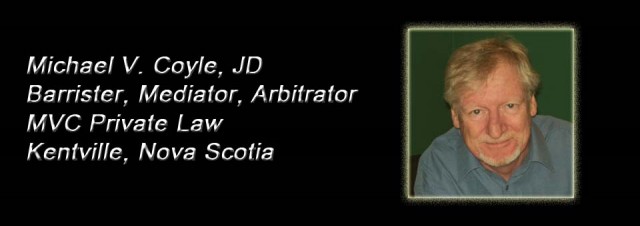by Michael V. Coyle, JD*
The spirit and intention of Nova Scotia’s Municipal Government Act (MGA) is to ensure that municipal councils and committees conduct public business in public, in open sessions where all are free to attend and see for themselves how public business is being conducted.
In certain exceptional cases, however, Council is permitted to meet in closed session where the public is excluded, often called in camera meetings. The only things that can legally be discussed in a meeting where the public is excluded are specifically listed in s. 22 of the MGA:
- The buying, selling or lease of municipal property
- Establishing the minimum price to be accepted at a Tax Sale
- Personnel matters
- Labour relations
- Contract negotiations
- Litigation or potential litigation
- Privileged legal advice or
- Public security issues
However, beyond providing directions to staff and/or municipal solicitors, Council is not permitted to make any decisions in a closed or in camera meeting. That can only be done in an open, public meeting.
Council is required by law to specify in its minutes the type of matter that was discussed in a closed session. In my view, that means that the motion to go in camera must specify which of the above items listed in s. 22 are to be discussed outside of the public purview. Only in that way can a member of the public be satisfied that Council had the legal authority to meet in private.
The same rule applies to all meetings of committees that are appointed by council and, in my opinion, to all meetings of inter-municipal services corporations established under s. 60 of the MGA, which includes, for example, regional transportation or solid waste management authorities.
Unfortunately I often see minutes from municipal Councils and related bodies that fail to give any reason for conducting public business in private. The minutes often merely record that Council went “in camera” on motion, without giving any reason, followed by an annotation that there was “no report” coming out of the closed session.
In my view, Councils or municipal bodies that operate in that manner are in violation of the MGA and are taking a risk that their private proceedings could be challenged. They are also inadvertently contributing to public suspicion and mistrust of government. It makes no sense for Councils to do that when it is so easy to avoid by simply having the motion specify a lawful reason for going into a closed session. It would, in my opinion, be perfectly acceptable simply to move a motion to go in camera, for example, “to discuss a labour relations matter” or “to receive a legal opinion” or “to set a minimum acceptable price at a tax sale”.
*Michael V. Coyle, JD is an experienced municipal government lawyer. He is currently Town Solicitor for Bridgetown, Nova Scotia. The opinions expressed in this article are his own and are intended for general information only, not as legal advice on your particular situation. For more information, please visit his website at michaelcoyle.ca He can be reached by email at [email protected]
© MVC Private Law 2012
